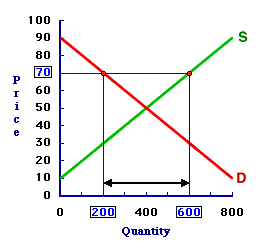
|
|
EUROPEAN CURRENCY UNIT: The forerunner of the euro that will be officially introduced in the European Union in 2002. Commonly referred to as the ECU, the European Currency Unit is the weighted average of the currencies of the twelve original nations of the European Union. In that there are is no paper currency yet, it is currently used primarily for big-time commercial, financial, and international transactions.
Visit the GLOSS*arama
|
|


|

|
                           EXCESS SUPPLY: A disequilibrium condition in a competitive market in which the quantity supplied is greater than the quantity demanded. Excess supply is another way to say surplus. It also goes by the common term of buyers' market. Excess supply is one of two disequilibrium states of the market. The other is excess demand (or shortage). Excess supply emerges in a market when the quantity supplied by the sellers exceeds the quantity demanded by the buyers... at a given market price. Sellers are seeking to sell more of the good than buyers are willing to buy, hence there is an "extra" or "excess" amount of supply.| Excess Supply |  |
Excess supply is illustrated using the market for 8-track tapes displayed in this exhibit. This graph was generated with data from the 88th Annual Trackmania 8-Track Tape Collectors Convention at the Shady Valley Exposition Center.The excess supply for 8-track tapes is indicated as the difference between the quantity supplied and the quantity demanded at a specific market price. In particular, at a 70-cent price, the quantity supplied is 600 tapes and the quantity demanded is 200 tapes. Sellers are willing and able to sell 400 tapes more than buyers are willing and able to buy. Hence this market has an excess supply of 400 tapes. The result of this excess supply is a decrease in the market price. Because sellers are unable to sell as much of the good as they want, they are inclined to bid down the price. Of course, as the price falls, the quantity demanded increases and the quantity supplied decreases, both acting to reduce the amount of the excess supply. Ultimately the entire excess supply is eliminated and equilibrium is restored.

Recommended Citation:EXCESS SUPPLY, AmosWEB Encyclonomic WEB*pedia, http://www.AmosWEB.com, AmosWEB LLC, 2000-2025. [Accessed: July 18, 2025].
Check Out These Related Terms... | | | | | | | |
Or For A Little Background... | | | | | | | | | |
And For Further Study... | | | | | | | |
Search Again?
Back to the WEB*pedia
|



|

|
YELLOW CHIPPEROON
[What's This?]
Today, you are likely to spend a great deal of time searching the newspaper want ads trying to buy either a T-shirt commemorating the 2000 Olympics or a genuine fake plastic Tiffany lamp. Be on the lookout for telephone calls from former employers.
Your Complete Scope
This isn't me! What am I?
|

|
|
On a typical day, the United States Mint produces over $1 million worth of dimes.
|

|
|
"A winner is someone who recognizes his God-given talents, works his tail off to develop them into skills, and uses those skills to accomplish his goals. " -- Larry Bird, basketball player
|

|
NLREG
Nonlinear Statistical Regression
|

|
|
Tell us what you think about AmosWEB. Like what you see? Have suggestions for improvements? Let us know. Click the User Feedback link.
User Feedback
|


|


